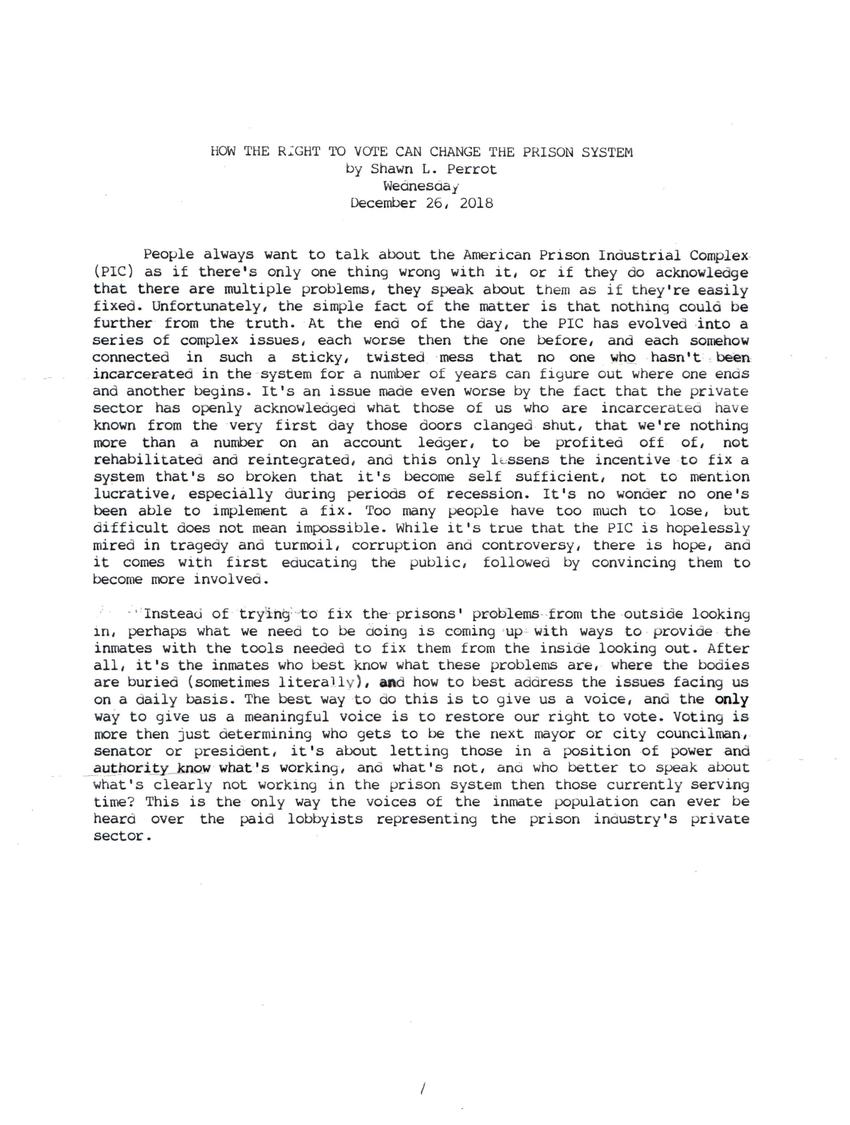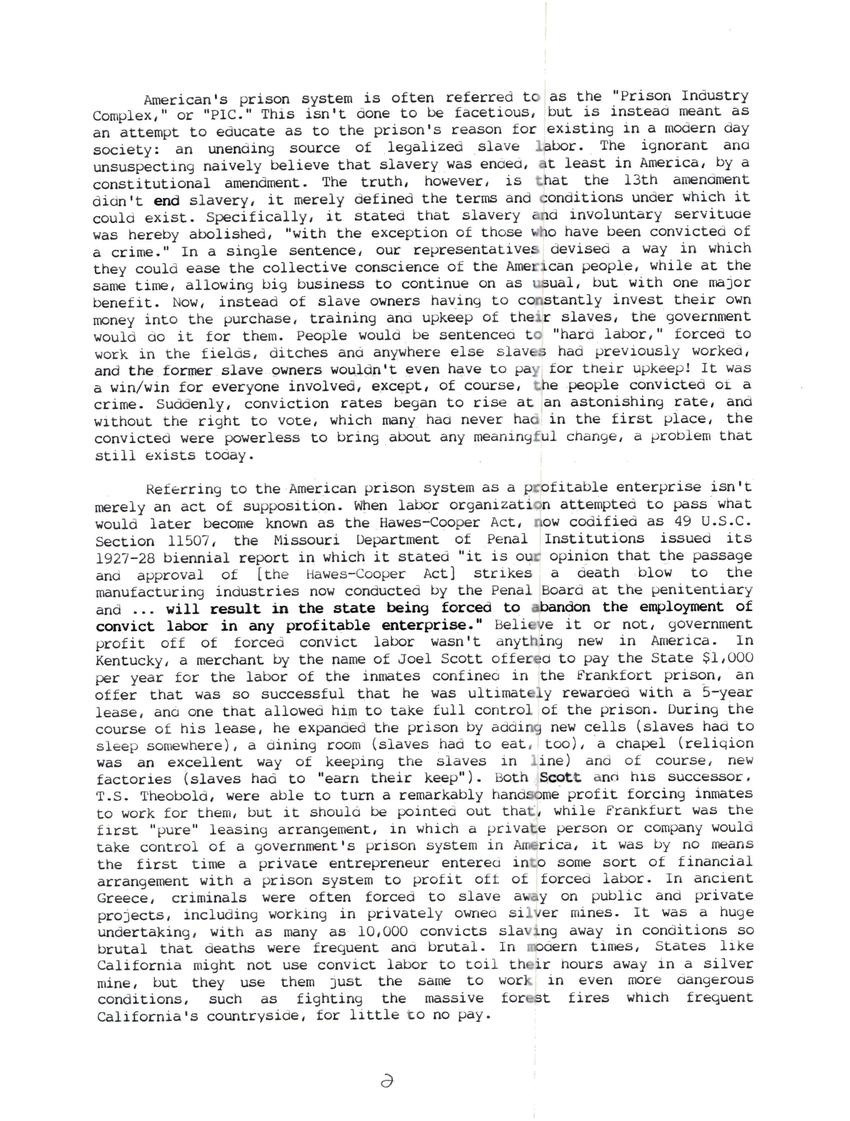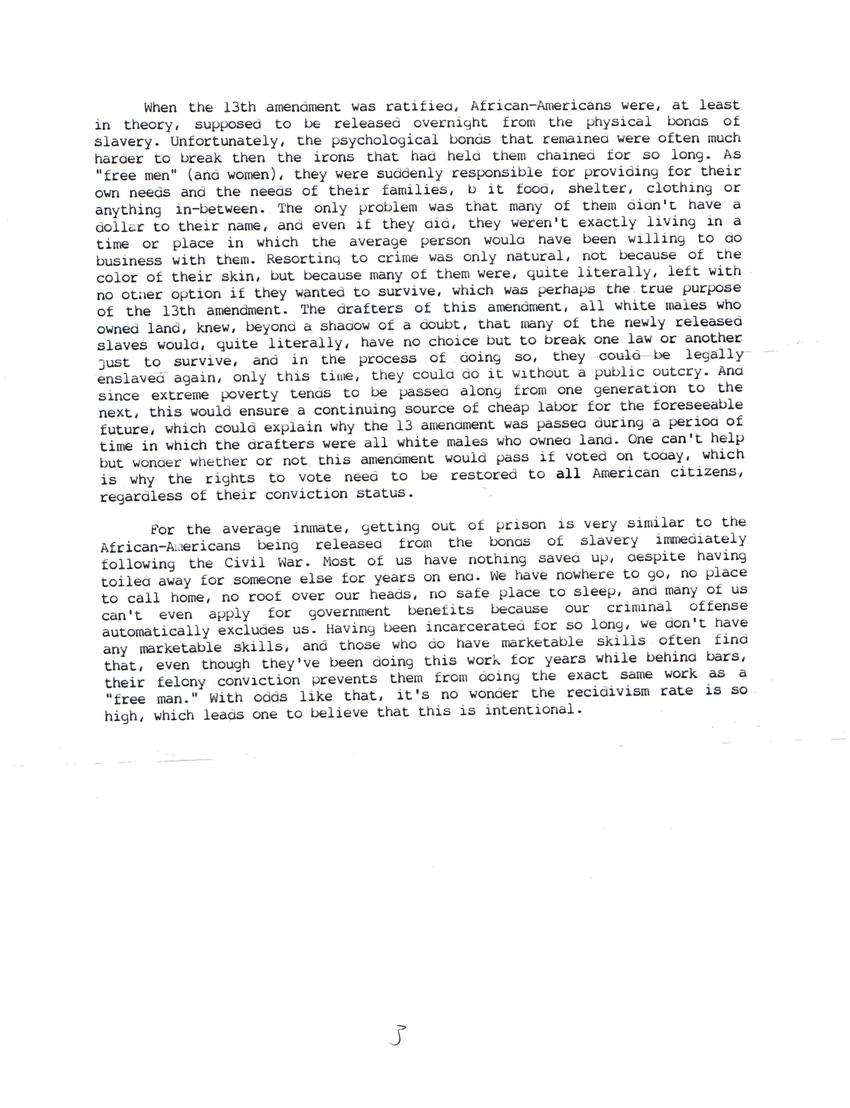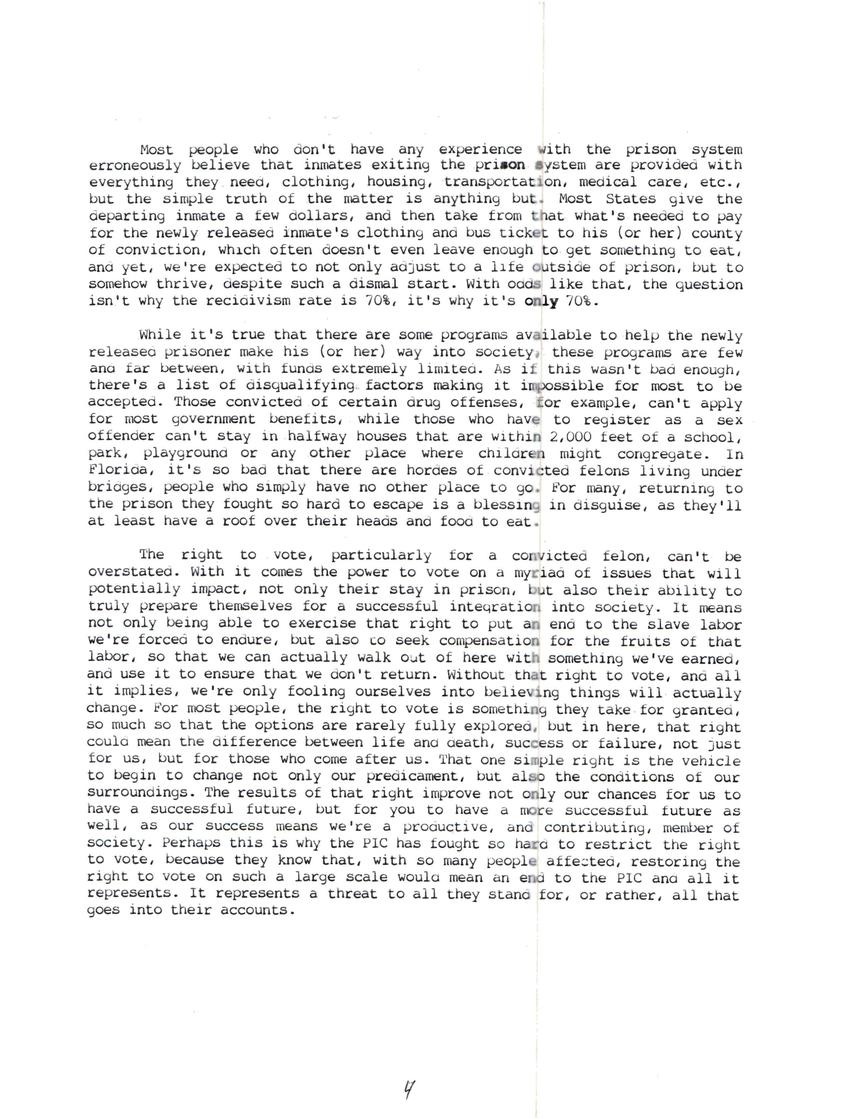
Transcription
HOW THE RIGHT TO VOTE CAN CHANGE THE PRISON SYSTEM
by Shawn L. Perrot
Wednesday
December 26, 2018
People always want to talk about the American Prison Industrial Complex (PIC) as if there's only one thing wrong with it, or if they do acknowledge that there are multiple problems, they speak about them as if they're easily fixed. Unfortunately, the simple fact of the matter is that nothing could be further from the truth. At the end of the day, the PIC has evolved into a series of complex issues, each worse than the one before, and each somehow connected in such a sticky, twisted mess that no one who hasn't been incarcerated in the system for a number of years can figure out where one ends and another begins. It's an issue made even worse by the fact that the private sector has openly acknowledged what those of us who are incarcerated have known from the very first day those doors clanged shut, that we're nothing more than a number on an account ledger, to be profited off of, not rehabilitated and reintegrated, and this only lessens the incentive to fix a system that's so broken that it's become self sufficient, not to mention lucrative, especially during periods of recession. It's no wonder no one's been able to implement a fix. Too many people have too much to lose, but difficult does not mean impossible. While it's true that the PIC is hopelessly mired in tragedy and turmoil, corruption and controversy, there is hope, and it comes with first educating the public, followed by convincing them to become more involved.
Instead of trying to fix the prisons' problems from the outside looking in, perhaps what we need to be doing is coming up with ways to provide the inmates with the tools needed to fix them from the inside looking out. After all, it's the inmates who best know what these problems are, where the bodies are buried (sometimes literally), and how to best address the issues facing us on a daily basis. The best way to do this is to give us a voice, and the only way to give us a meaningful voice is to restore our right to vote. Voting is more than just determining who gets to be the next mayor or city councilman, senator or president, it's about letting those in a position of power and authority know what's working, and what's not, and who better to speak about what's clearly not working in the prison system than those currently serving time? This is the only way the voices of the inmate population can ever be heard over the paid lobbyists representing the prison industry's private sector.
America's prison system is often referred to as the "Prison Industry Complex", or PIC. This isn't done to be facetious, but is instead meant as an attempt to educate as to the prison's reason for existing in a modern day society: an unending source of legalized slave labor. The ignorant and unsuspecting naively believe that slavery was ended, at least in America, by a constitutional amendment. The truth, however, is that the 13th amendment didn't end slavery, it merely defined the terms and conditions under which it could exist. Specifically, it stated that slavery and involuntary servitude was hereby abolished, "with the exception of those who have been convicted of a crime." In a single sentence, our representatives devised a way in which they could ease the collective conscience of the American people, while at the same time, allowing big business to continue on as usual, but with one major benefit. Now, instead of slave owners having to constantly invest their own money into the purchase, training and upkeep of their slaves, the government would do it for them. People would be sentenced to "hard labor", forced to work in the fields, ditches and anywhere else slaves had previously worked, and the former slave owners wouldn't even have to pay for their upkeep! It was a win/win for everyone involved, except, of course, the people convicted of a crime. Suddenly, conviction rates began to rise at an astonishing rate, and without the right to vote, which many had never had in the first place, the convicted were powerless to bring about any meaningful change, a problem that still exists today.
Referring to the American prison system as a profitable enterprise isn't merely an act of supposition. When labor organization attempted to pass what would later become known as the Hawes-Cooper Act, now codified as 49 U.S.C. Section 11507, the Missouri Department of Penal Institutions issued its 1927-28 biennial report in which it stated "it is our opinion that the passage and approval of [the Hawes-Cooper Act] strikes a death blow to the manufacturing industries now conducted by the Penal Board at the penitentiary and ... will result in the state being forced to abandon the employment of convict labor in any profitable enterprise." Believe it or not, government profit off of forced convict labor wasn't anything new in America. In Kentucky, a merchant by the name of Joel Scott offered to pay the State $1,000 per year for the labor of the inmates confined in the Frankfort prison, an offer that was so successful that he was ultimately rewarded with a 5-year lease, and one that allowed him to take full control of the prison. During the course of his lease, he expanded the prison by adding new cells (slaves had to sleep somewhere), a dining room (slaves had to eat, too), a chapel (religion was an excellent way of keeping the slaves in line) and of course, new factories (slaves had to "earn their keep"). Both Scott and his successor, T.S. Theobold, were able to turn a remarkably handsome profit forcing inmates to work for them, but it should be pointed out that, while Frankfort was the first "pure" leasing arrangement, in which a private person or company would take control of a government's prison system in America, it was by no means the first time a private entrepreneur entered into some sort of financial arrangement with a prison system to profit off of forced labor. In ancient Greece, criminals were often forced to slave away on public and private projects, including working in privately owned silver mines. It was a huge undertaking, with as many as 10,000 convicts slaving away in conditions so brutal that deaths were frequent and brutal. In modern times, States like California might not use convict labor to toil their hours away in a silver mine, but they use them just the same to work in even more dangerous conditions, such as fighting the massive forest fires which frequent California's countryside, for little to no pay.
When the 13th amendment was ratified, African-Americans were, at least in theory, supposed to be released overnight from the physical bonds of slavery. Unfortunately, the psychological bonds that remained were often much harder to break than the irons that had held them chained for so long. As "free men" (and women), they were suddenly responsible for providing for their own needs and the needs of their families, b it food, shelter, clothing or anything in-between. The only problem was that many of them didn't have a dollar to their name, and even if they did, they weren't exactly living in a time or place in which the average person would have been willing to do business with them. Resorting to crime was only natural, not because of the color of their skin, but because many of them were, quite literally, left with no other option if they wanted to survive, which was perhaps the true purpose of the 13th amendment. The drafters of this amendment, all white males who owned land, knew, beyond a shadow of a doubt, that many of the newly released slaves would, quite literally, have no choice but to break one law or another just to survive, and in the process of doing so, they could be legally enslaved again, only this time, they could do it without a public outcry. And since extreme poverty tends to be passed along from one generation to the next, this would ensure a continuing source of cheap labor for the foreseeable future, which could explain why the 13 amendment was passed during a period of time in which the drafters were all white males who owned land. One can't help but wonder whether or not this amendment would pass if voted on today, which is why the rights to vote need to be restored to all American citizens, regardless of their conviction status.
For the average inmate, getting out of prison is very similar to the African-Americans being released from the bonds of slavery immediately following the Civil War. Most of us have nothing saved up, despite having toiled away for someone else for years on end. We have nowhere to go, no place to call home, no roof over our heads, no safe place to sleep, and many of us can't even apply for government benefits because our criminal offense automatically excludes us. Having been incarcerated for so long, we don't have any marketable skills, and those who do have marketable skills often find that, even though they've been doing this work for years while behind bars, their felony conviction prevents them from doing the exact same work as a "free man". With odds like that, it's no wonder the recidivism rate is so high, which leads one to believe that this is intentional.
Most people who don't have any experience with the prison system erroneously believe that inmates exiting the prison system are provided with everything they need, clothing, housing, transportation, medical care, etc., but the simple truth of the matter is anything but. Most States give the departing inmate a few dollars, and then take from that what's needed to pay for the newly released inmate's clothing and bus ticket to his (or her) county of conviction, which often doesn't even leave enough to get something to eat, and yet, we're expected to not only adjust to a life outside of prison, but to somehow thrive, despite such a dismal start. With odds like that, the question isn't why the recidivism rate is 70%, it's why it's only 70%.
While it's true that there are some programs available to help the newly released prisoner make his (or her) way into society, these programs are few and far between, with funds extremely limited. As if this wasn't bad enough, there's a list of disqualifying factors making it impossible for most to be accepted. Those convicted of certain drug offenses, for example, can't apply for most government benefits, while those who have to register as a sex offender can't stay in halfway houses that are within 2,000 feet of a school, park, playground or any other place where children might congregate. In Florida, it's so bad that there are hordes of convicted felons living under bridges, people who simply have no other place to go. For many, returning to the prison they fought so hard to escape is a blessing in disguise, as they'll at least have a roof over their heads and food to eat.
The right to vote, particularly for a convicted felon, can't be overstated. With it comes the power to vote on a myriad of issues that will potentially impact, not only their stay in prison, but also their ability to truly prepare themselves for a successful integration into society. It means not only being able to exercise that right to put an end to the slave labor we're forced to endure, but also to seek compensation for the fruits of that labor, so that we can actually walk out of here with something we've earned, and use it to ensure that we don't return. Without that right to vote, and all it implies, we're only fooling ourselves into believing things will actually change. For most people, the right to vote is something they take for granted, so much so that the options are rarely fully explored, but in here, that right could mean the difference between life and death, success or failure, not just for us, but for those who come after us. That one simple right is the vehicle to begin to change not only our predicament, but also the conditions of our surroundings. The results of that right improve not only our chances for us to have a successful future, but for you to have a more successful future as well, as our success means we're a productive, and contributing, member of society. Perhaps this is why the PIC has fought so hard to restrict the right to vote, because they know that, with so many people affected, restoring the right to vote on such a large scale would mean an end to the PIC and all it represents. It represents a threat to all they stand for, or rather, all that goes into their accounts.
Other posts by this author
|
2020 aug 12

|
2020 aug 12

|
2020 may 30

|
2020 may 30

|
2020 may 30

|
2020 may 24

|
More... |





Replies